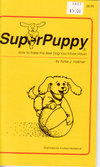 Any time of year is a good time for a new puppy, but this time of year will see a larger number of new puppies getting homes. More pertinently, there will be a lot of new puppies who are suprises for their lucky new owners. That's great, except that it may mean that the new owner is not really prepared for the challenges of a new pup. They just don't understand the "nuts and bolts" of raising a dog. The generous giver failed to include an owner's manual. Consequently they can become frustrated when the playful puppy doesn't grow up to be the wonderful family pet they envisioned.
Any time of year is a good time for a new puppy, but this time of year will see a larger number of new puppies getting homes. More pertinently, there will be a lot of new puppies who are suprises for their lucky new owners. That's great, except that it may mean that the new owner is not really prepared for the challenges of a new pup. They just don't understand the "nuts and bolts" of raising a dog. The generous giver failed to include an owner's manual. Consequently they can become frustrated when the playful puppy doesn't grow up to be the wonderful family pet they envisioned.
 There are many hurdles to be overcome in a raising a puppy, such as: control in your absence, discipline, house-training, chewing, barking, and jumping up on people. Coincidentally, those just happen to be chapters in this little book. Peter Vollmer is a behavior specialist, and in each of the chapters, he tells you what your dog is doing and thinking and why. No matter what your puppy looks like on the outside, he's a wolf on the inside. He has hard-wired instincts in his brain, and reflexes in his body. Dr. Vollmer explains these, and, better yet, gives you a step-by-step program to USE what's already there instead of trying to over-ride nature. You have the understanding to be a good wolf parent instead of trying to make the dog into some kind of weird, hairy, little kid. The buttons are already in there and he teaches you how to push them.
There are many hurdles to be overcome in a raising a puppy, such as: control in your absence, discipline, house-training, chewing, barking, and jumping up on people. Coincidentally, those just happen to be chapters in this little book. Peter Vollmer is a behavior specialist, and in each of the chapters, he tells you what your dog is doing and thinking and why. No matter what your puppy looks like on the outside, he's a wolf on the inside. He has hard-wired instincts in his brain, and reflexes in his body. Dr. Vollmer explains these, and, better yet, gives you a step-by-step program to USE what's already there instead of trying to over-ride nature. You have the understanding to be a good wolf parent instead of trying to make the dog into some kind of weird, hairy, little kid. The buttons are already in there and he teaches you how to push them.
You gain an understanding of how your dog is relating to the family as a pack, and you learn how to be the leader of the pack (as least as far as the dog is concerned). Your puppy is looking to you for leadership, and if you don't give it, he will begin testing you to see how far he can go. It starts out as play, true enough, but it's play that's designed to see how high he can rise in the pecking order. There are a lot of reasons why you should be the leader instead of your dog. For one thing, you pay the bills, and for another, you look both ways before crossing the street.
 These methods are so well explained, and they work so well. I cannot say enough good about this book. I used the first edition back in 1981 to train my Rottweiler, Anna. At nine weeks of age, she would growl, snarl and try to bite you if you reached for her food, or tried to pick her up. Without "Super Puppy", I would have had to get rid of her. Using the book (plus some formal obedience training later), we completely turned her around. When our children came along later, they were able to take food from her mouth and walk off with it. Instead of a snarl, she just gave a kind of goofy, grinning, "Okey dokey" type reaction.
These methods are so well explained, and they work so well. I cannot say enough good about this book. I used the first edition back in 1981 to train my Rottweiler, Anna. At nine weeks of age, she would growl, snarl and try to bite you if you reached for her food, or tried to pick her up. Without "Super Puppy", I would have had to get rid of her. Using the book (plus some formal obedience training later), we completely turned her around. When our children came along later, they were able to take food from her mouth and walk off with it. Instead of a snarl, she just gave a kind of goofy, grinning, "Okey dokey" type reaction.
Anna was a pushy pup, as many are. The methods work faster for a more cooperative dog, like our Golden Retriever, Buster. He was a doormat, just dying to please. The body language we learned from "Super Puppy" helped us show him what we wanted. He could find his niche faster.
 Behavior problems are the number one reason dogs are relinquished to shelters. All puppies are cute, but many need some education to stay that way. When I worked at a shelter back in '73, I got pretty tired of hearing "He was so cute when he was a puppy, but now we don't like him anymore." Using the "Super Puppy" book methods between the ages of 7 and 16 weeks of age will head off most any behavior problem you can think of.
Behavior problems are the number one reason dogs are relinquished to shelters. All puppies are cute, but many need some education to stay that way. When I worked at a shelter back in '73, I got pretty tired of hearing "He was so cute when he was a puppy, but now we don't like him anymore." Using the "Super Puppy" book methods between the ages of 7 and 16 weeks of age will head off most any behavior problem you can think of.
I love this book so much that we don't mark them up to suggested retail cost. We want people to have them. Each section is short and concise. Here's what your dog is doing and why. Here's your step-by-step program to get him to do what you want to him to do. The longest section in the book is four pages, and that's the best discussion of house-training I've ever seen anywhere. Check out the Super Puppy website and get this book if you have a new puppy. If you know someone with a new puppy, get this book for them. I know you can order them on-line, and we always have a stock of them here at KVC.
 These first weeks with your new puppy are the critical time in establishing your relationship with the puppy and molding his future behavior. He can be just as happy with you as leader of the pack, and you will be a lot happier if you are the leader instead of your dog. GET THE BOOK! Read it. Use it.
These first weeks with your new puppy are the critical time in establishing your relationship with the puppy and molding his future behavior. He can be just as happy with you as leader of the pack, and you will be a lot happier if you are the leader instead of your dog. GET THE BOOK! Read it. Use it.


Nice tips! I will be saving this page to my favorites for sure. http://www.petdoor-4less.com
Puppies are very cute and adorable.I like what you say about dogs,No matter what your puppy looks like on the outside, he’s a wolf on the inside.